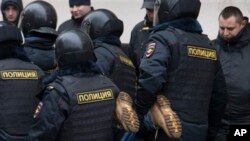Once again the Russian government has moved to shrink the space for civil society in Russia. Moscow has passed a new law that empowers prosecutors to ban the activities of what the law refers to as “undesirable foreign or international organizations” which the state deems a threat to national security or constitutional order or “the basic values of the Russian state” -- vague descriptions the implementation of which could paralyze a variety of non-governmental organizations and threaten the freedoms of expression and association, as well as other human rights.
Human rights NGOs such as Amnesty International and Human Rights Watch regard the new law as part of an “ongoing draconian crackdown which is squeezing the life out of civil society” in Russia. In 2012, another law was passed requiring any group in Russia that receives international funding to register as a “foreign agent,” an expression synonymous in Russia with the word “spy.”
U.S. State Department Deputy Spokesperson Marie Harf said in a written statement that the United States is “deeply troubled” by Russia’s new law and noted that in addition to banning the activities of undesirable foreign or international organizations, the law criminalizes any “cooperation with groups” with that designation.
“We are concerned this new power will further restrict the work of civil society in Russia and is a further example of the Russian government’s growing crackdown on independent voices and intentional steps to isolate the Russian people from the world,” she said.
“We continue to be concerned about increasing restrictions on independent media, civil society, members of minority groups, and the political opposition. Russians, like people everywhere, deserve a government that supports an open marketplace of ideas, transparent and accountable governance, equal treatment under the law and the ability to exercise their rights without fear of retribution,” said Deputy Spokesperson Harf.
“We urge the Government of Russia to uphold its international obligations and commitments to respect the freedoms of expression, peaceful assembly and association, and the rule of law.”

















